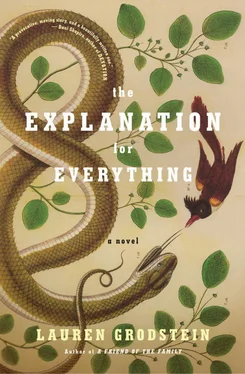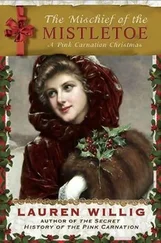On NPR, someone nattered about climate change, but outside, the lion of mid-March, it was still freezing.
Next week it would be spring break. On spring breaks past he’d visited his mother in Ohio, and once, with the girls, he took an all-inclusive junket to Puerto Rico. The girls had angled for Disney World but for years Andy didn’t think he could face taking them there. Now he thought, sure, he could take them to Florida. Orlando was nowhere near Miami or Okeechobee but even if it was, even if they wanted to see Miami, visit the shores where Lou’s ashes had been sprinkled, wouldn’t that be fine? Wasn’t Lou all around them, no matter where they went?
He had barely started reading the Lewis but already he’d found something he liked: “No one ever told me that grief felt so like fear.”
He turned down the radio. If the house had a fireplace, he would have lit a fire. For so long he had only been aware of his grief and fear.
But now that he remembered his body, and his body’s soulless needs, they were becoming harder to put away. Oh, Melissa, with the soft skin and the wheat-colored hair—he couldn’t get enough of her. What would Lou think of that? He could imagine her shaking her head, her expression indulgent, saying, really, Andrew? A student?
Andy put down the Lewis, closed his eyes. Lou in the chair opposite him. After all these years, Andrew, this was the best you could do? A chubby mousy student? Even now, chastising him in his imagination, she felt closer than she had in a long time. Andy smiled. “I like her, baby, because she brought me back to you.”
Don’t be ridiculous, Lou said in his imagination. You like her because she felt you up.
The other night—two in the morning, only the second time Melissa had come over that late (she couldn’t sleep, she said, and neither could he)—he and Melissa sat out on the porch. In the darkness, across the street, a family of deer wandered by. Melissa was wearing a big fuzzy sweater, pumpkin-colored (she grinned when he complimented it), and in the darkness she seemed to him to be a series of textures rather than colors, soft skin, puffy hair, fuzzy sweater. It was cold out but she was warm, and his leg was warm where it pressed against hers.
They had not slept together yet. Andy wasn’t sure they would. It seemed wrong, not only morally wrong, but also temperamentally wrong, like it would ruin the fragile equilibrium of desire and trust and hope that lived between them. Or maybe Andy was just scared of the consequences. He reached for her hand.
There, in the cold, on his back steps, they talked for an hour, until they realized how cold they were, and that they should either go inside and risk whatever they might do inside, or else Melissa should go home. She decided to go home. But first she asked him what he was doing over spring break because she was trying to decide whether or not to go home to Hollyville. Usually she went to her parents’ house, but this year she wasn’t sure.
“Will your parents miss you?”
“I doubt it,” she said. “They’re awfully busy.” From what he could gather about Melissa’s parents, they each worked several part-time jobs in convenience stores, fast-food outlets, the mall. They only saw each other for any quality time on Sundays, at church.
“Well, I think we’re staying here,” Andy said. “We don’t have any big plans but we’d be happy to spend time with you.”
“I was hoping,” she said, shy.
“I think I might take the girls to the beach one day if you want to come.”
“In March?”
“It’s sort of fun to see the ocean in the winter,” Andy said. “You feel like outlaws, since you’re the only people there. We stay for a little while and then we go eat fried fish or something at a seafood shack in Absecon. It’s like a vacation.”
“That sounds like fun,” Melissa said. “I’d love to come.”
They grew colder. She went home. But first they kissed in the shy darkness, on his back step, decorously, like teenagers from a long-ago era, an era that maybe even then was make-believe—was anyone ever really so decorous?—or maybe they kissed like visitors from Melissa’s world, where people behaved righteously and according to some plan of God’s; they behaved like good citizens, like just, modest citizens, except that when she reached her hand inside his jeans he shuddered and let her keep doing exactly what she seemed to know how to do surprisingly well.
THE PHONE CALL came just before he headed off to his final class before spring break. The woman on the other end had a thick North Florida accent, the kind that pronounced alligator “ally-gay-tor.” Not that she was calling to discuss alligators.
“On behalf of the Florida Parole Commission I wanted to inform you that Oliver McGee, prisoner N24633, has been denied parole, and will not be eligible again for another two years, at which point he will have served his term’s limit.”
Andy leaned back against his desk. “Thank you,” he said. “Thank you for calling.”
“Have a nice day,” said the woman, and clicked off. Three times, then. Three times he had managed to keep McGee behind bars, and wasn’t that a wonderful thing? Wasn’t that the best thing? Because no matter his current ambiguities, if his research had proven anything it was that alcoholics were always alcoholics. (And just ask one, right? Go to an AA meeting and what do you learn? Ask Sheila and what will she tell you? They can never drink again! They can never handle it again!) Moreover, McGee had proven, not just in the murder of his wife but in the two DUIs that preceded it, that he himself was irredeemable. He would never be cured, he would never not be a drunk. The only safe place for someone like him was in prison.
So why was Joyce McGee’s voice everywhere?
Mister! Hey, Mister!
The first time Oliver had been denied, Andy was ecstatic, and the second time he was pleased; but now—now he wished Joyce McGee would stop talking. He wanted Lou to talk to him instead, but he couldn’t hear her. All these other voices in his head: Rosenblum, McGee, Melissa, God. Lou? Lou—say something.
Oliver McGee had gotten his BA in prison. I thought you, a college professor, would understand.
A knock on the door, the soft familiar knock. He threw open the door like he’d been waiting for her his whole life.
“I thought I’d find you here,” she said. He shut the door behind Melissa, put his arms around her wide, warm body, pulled her face toward his. He hadn’t seen her all day and hadn’t realized that he’d missed her. “What happened?”
“I just got some news,” he whispered into her cheek. She reared back to look at him, alarmed.
“I mean, I’m fine—I just, the man who killed my wife. He was denied parole again.”
“That’s good news, right?” she said, and bless her for not acting like an undergraduate, bouncing up and down and saying “awesome!” She understood the gravity of it (that’s what he needed, he needed gravity) and took a step back from him and leaned against his desk, a precarious pile of midterms. “That’s what you wanted, right? When you went to Florida?”
“I feel strange about it, though.”
“Guilty?”
He looked at her, the broad planes of her open face. Her soft, youthful skin. “I guess I do.”
“That’s crazy. I mean, no offense, but that’s crazy. This is the man who killed your wife. Who deprived your daughters of their mother. He should stay in jail forever—”
“Yes, but—”
“Remember when I told you God was just? Is this why you asked me?”
He nodded. He loved her.
“Listen, not only is God just, but this is what is just. This is the punishment that is just, right? Parole—what is parole? It’s a way of getting out early. A way of not serving out your punishment. That’s all it is. A way of dodging the bullet. Why should this man get parole? He’s a murderer! Why should he dodge the bullet? He should probably rot in there, shouldn’t he? I mean, if that’s what the state sentenced him to? To rot in there?”
Читать дальше












